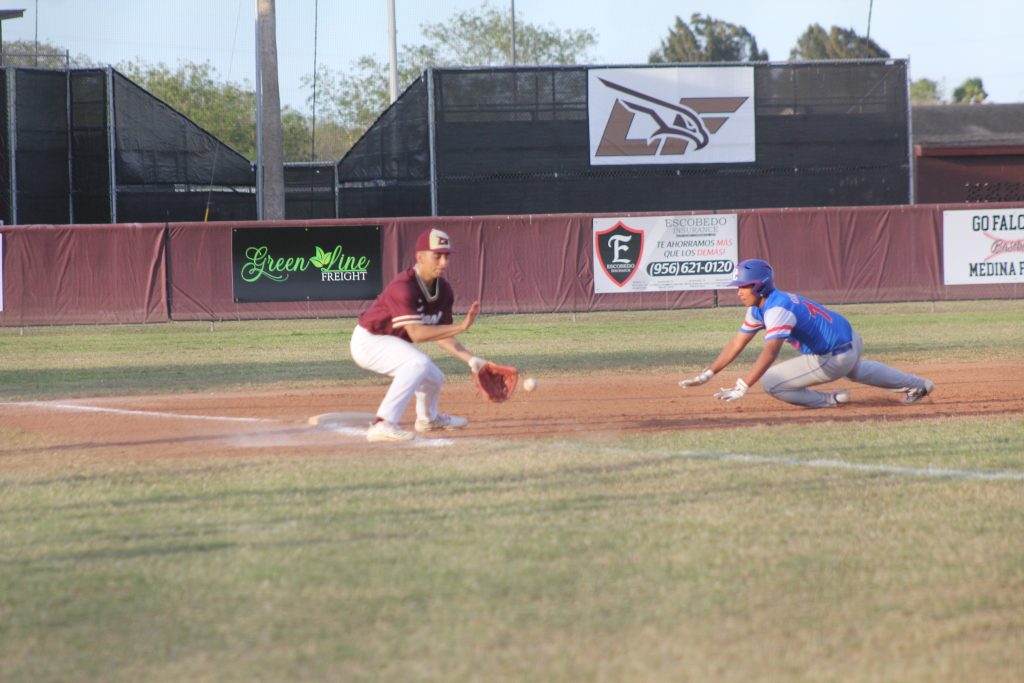By CLAIRE CRUZ, Staff Writer
During a recent webinar, University Interscholastic League director of athletics Dr. Susan Elza recommended that baseball and softball coaches plan for the possibility of not playing tournaments in the spring.
Volleyball and basketball coaches have made that adjustment for fall competition, and the UIL restructured postseason play in several sports to eliminate regional and state tournaments in response to the COVID-19 pandemic. The final decision for baseball and softball will be made at a later date, but East Valley coaches have begun making alternate plans.
“I understand maybe wanting equality since other sports aren’t able to have tournaments. Maybe it’s a safety issue, because we’re still in the unknown. But I think it might be a little too premature to make that call,” San Benito softball coach Denise Lira said. “But obviously, whatever UIL decides, we’ll adapt to. I don’t want us to not have tournaments, but I’d rather have a full season. I’ve already talked to a lot of coaches that want to pick up games, and I know we’ll be fine with those quality games.”
Tournaments provide a variety of benefits for programs, both on and off the field. Teams will play anywhere between three and six games per weekend during tournament season, presenting plenty of opportunities to mix up lineups, throw a lot of pitchers and get their players game experience.
“Tournaments are huge for us. It’s tough that we might not have any, but at the end of the day we want to make sure our girls are safe and we respect any decision that’s made,” Porter softball coach Leo Zamarripa said. “We’re big on feeder and the next-person-up mentality. That’s what we use tournaments for, especially at Porter where we get a lot of girls that are barely starting softball their freshman year. We bring a lot of JV girls with us to tournaments so they can get playing time … and get familiarized with the ins and outs of softball.”
Rio Hondo baseball coach Sergio Gonzalez expressed similar feelings. Tournaments are almost doubly important for development this upcoming year after seasons were cut short this spring.
“My big concern is our kids not developing because no one’s playing. We didn’t have any summer baseball, and I’ve got the guys coming up from the junior high and they got shut down as well,” Gonzalez said. “If we have those tournaments taken away, it’s going to hurt us in the long run, trying to get ready for a district season. That’s where the evaluation part comes into play. We get our guys on the mound and give guys at-bats to figure out lineups.”
While some teams stay local, others will travel to places like Laredo, Corpus Christi, San Antonio and surrounding areas to face new competition and build camaraderie on the road.
“It’s the intangible things, like getting to know each other more and interact more when you travel, when you spend all that time with each other,” Lira said. “During tournament season, the cohesiveness of the team starts building, the chemistry starts building. And it’s the quality of the games. It’s seeing somebody different to help you improve as a team, seeing something (a team up north) has that maybe we don’t see here in the Valley.”
Los Fresnos baseball coach Rene Morales likes to challenge his team with programs up north, too. The Falcons are always aiming for a long playoff run, and traveling for tournaments can give them an early look at some programs they’ll face in the postseason and lets them see how they compare.
“You’re always trying to play the top-tier programs in the Valley and wherever you go to measure yourself with them,” Morales said. “We compare what they do and what we do. We’ll talk as a program, say, ‘Did you see what that program is doing? We’re doing that, too,’ to show why we’re coaching what we are and how it helps. You face very good competition and you judge yourself, where you’re at as a player and as a team.”
Coaches have been communicating as they discuss ways to replicate the benefits of tournaments and get games penciled into a secondary schedule. Some options being floated are playing a three-game series against a team, scheduling doubleheaders and increasing intrasquad competitions at practice.
“We’re working on a backup plan to play games with teams close by,” Morales said. “We’re trying to set up, like, a series, where we’d go home and home. Just to try and get our pitchers to throw like a tournament, play three games and stay in the same rhythm of a tournament, but you’re facing one team.”
Gonzalez is working on Plan B, too, and he and Morales spoke Friday to pencil each other in on backup schedules. Gonzalez said he has been talking with many coaches as they try to juggle the uncertainty, stay positive for their players and make the best plans for their seasons.
“I had three tournaments set up already, and now I’m going to see, maybe play on Friday and play a doubleheader on Saturday to get three games in,” Gonzalez said. “We’re looking at picking up games with local teams to not travel too far … we won’t miss out on the talent level or competition (playing local). But then again, we don’t know how many games will be allowed. We’re just trying to do our best.”

